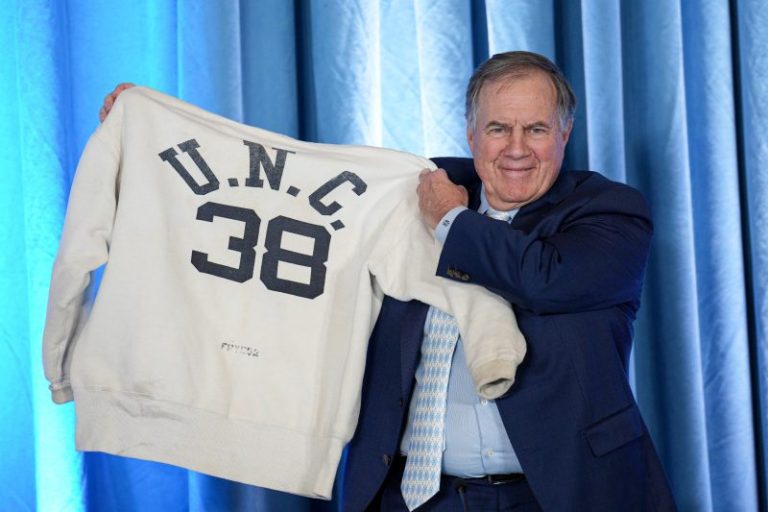Let’s look at this thing strictly from a status standpoint, eliminating all the other inconsequential noise.
It’s not that difficult to see disaster.
North Carolina hired a legendary former NFL coach, whose resume came into question once he no longer had the greatest player in the history of the sport playing quarterback for his team.
Not long after that, the former legendary NFL coach – who won six Super Bowls with that greatest player ever – was fired by the franchise he coached to unthinkable success after a 29-38 record in his last four seasons without the greatest player ever. The legendary coach had complete control of personnel, and after he was fired, the remaining 31 teams in the NFL weren’t interested.
So North Carolina, desperate to find its footing in an ever-changing collegiate sports environment where football is king and its beloved basketball has devolved into a five-week gambling bender, decides to hire Bill Belichick (see: former legendary NFL coach) as its new football coach.
I ask you, what in the world makes sense here?
Wait, it gets better.
After North Carolina chancellor Lee Roberts steered this Hail Mary of a quick fix and promised tens of millions in NIL money to kickstart change – in addition to a large portion of the revenue sharing pool of $20.5 million beginning in 2025 – Belichick hired former NFL general manager Michael Lombardi to do the same job in Chapel Hill.
The last time Lombardi was a general manager was 2013 with the Cleveland Browns.
Roberts proclaimed he wanted to make football the top priority at the university, and wanted to compete at the highest level. So he hired a former NFL coach who has never coached in the college game, who hired a general manager whose only college experience was recruiting coordinator at UNLV.
In 1984.
I don’t want to get all preachy, but the two most important positions in the ever-changing world of college football are coach and general manager. Both are delicate positions of equal parts authority, development, parental guidance and cheerleader.
Nothing screams “cheerleader” quite like Bill Belichick.
“I’ve always wanted to coach college football, and it just never really worked out,” Belichick said at his introductory press conference. “Had some good years in the NFL, so that was okay, but this is really kind of a dream come true.”
Somehow, someway, when North Carolina finally decided it was ready to get serious about football, it decided to ignore the empirical evidence staring it in the face. Look at the current College Football Playoff, and see the future of the sport dominated by first-time head coaches.
It took two seasons for Kenny Dillingham to take one of the worst Power Four conference programs in college football (saddled with NCAA probation) and turn it into Big 12 champions. Arizona State not only advanced to the playoff, it earned a first-round bye.
It took Spencer Danielson less than a year to take a rudderless Boise State program and win two Mountain West Conference championships — the second leading to a first-round bye in the CFP. Danielson took over in the last month of 2023 when the Broncos had a 5-5 record and less than 10 percent chance of winning the MWC, and has won 15 of 17 games since.
Then there’s Dan Lanning of Oregon and Marcus Freeman of Notre Dame, two of the hottest coaches in the sport. Both never had a head coaching job prior to their current gigs.
SMU coach Rhett Lashlee? Never been a head coach prior to arriving in Dallas in 2022.
That’s five first-year coaches in the CFP, and if you really want to get technical, Dabo Swinney (Clemson), Kirby Smart (Georgia) and Ryan Day (Ohio State) had never been head coaches before accepting their current jobs.
Let’s be very clear here: this isn’t about age, it’s about knowledge of the inner workings of the specific level of the sport. No question Belichick, 72, is a coaching giant, even with the shadow of Tom Brady skulking behind his every move.
But Belichick made his bones coaching grown men in a professional environment where he, for the most part, had control. While we can argue that college football looks more like the NFL with each passing season of change, you can’t dispute the distinct difference between the two levels of football.
As crazy as this sounds, college football players have more control than NFL players, who have a collectively bargained agreement protecting their every move. There is no agreement of any sort in college football.
From paying players who haven’t proven anything at the collegiate level, to the 20-hour contact limit with players, to academics (you know, the whole higher education thing), to NIL deals and – this is a biggie for Belichick and Lombardi – free player movement, this is all virgin territory. The man who has never coached college football in any capacity has been entrusted with turning North Carolina football from a fun diversion until basketball season, to a legitimate national power.
Those who can manage the process, and massage the egos, are those who win big. Those who can’t are forced out and given tens of millions in walkaway money.
It’s not that difficult to see where this is headed.
Matt Hayes is the senior national college football writer for USA TODAY Sports Network. Follow him on X at @MattHayesCFB.

